Food Safety for Children
Food Safety for Children
Why only safe food should be eaten?
- Protects health
- Prevents infections that cause diarrhoea, stomach upset, dysentery etc.
- Makes you feel healthy, alert, active and energetic
- You do better in everything yo do like studies, games, activities etc.
How does food get contaminated
Physically
| PHYSICAL CONTAMINATIONS | HOW TO DETECT |
|---|---|
| Any foreign material like stone,stems and seeds, feathers, sand,nails, dust, dirt, straw, hair etc. | Observe carefully, Feel with hands and Check by washing, sieving etc |
Chemically
| CHEMICAL CONTAMINATIONS | HOW TO DETECT |
|---|---|
| Non permitted additives like food colours, preservatives. | Look for unusual colour,odour and taste |
| Permitted additives added beyond safety limits | Fresh oil and used oil-not being mixed |
| Pesticide residues. | Special detection test can be done. |
| Insecticides. | |
| Reused oil. | |
| Adulterants. | |
| Cleaning Chemicals etc. |
Microbiologically
| MICROBIOLOGICAL CONTAMINATIONS | HOW TO DETECT |
|---|---|
| INVISIBlE: bacteria, yeast,protozoa, mold, viruses | Observe change in texture, odour and colour |
| VISIBLE: flies, worms,cockroaches, weevils,caterpillars etc.. | Special tests are available for each |
Your very own safety codes !
- Wash your hands vigorously with soap and clean water for 20 seconds before and after eating, after placing refuse in dustbins, using bathrooms, touching animals, coughing, sneezing etc.
- Throw garbage right into a covered garbage bin
- Keep raw foods physically separated from cooked foods
- Cover food during dusting and sweeping
- Refrigerate food promptly
- Wash all fruits properly under running water before use
- Do not eat if the food does not look, taste, smell or feel fresh and normal
- Do not touch body parts while having food
- Do not pick up food from ground
- Wipe your shoes on a door mat before coming to the food serving area
- Do not touch money, mobile, etc. after washing hands, before eating
- Do not keep your school bags, pets, etc. in food handling areas
- Do not keep your spoon or fork or your hand on the desk or the floor while eating
- Discard any packaged food if you find it tampered with
- Do not keep food directly on your desk
- Do not eat leftover food
- Do not eat uncovered food
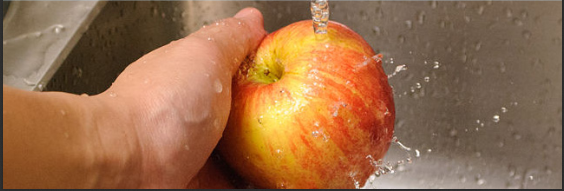
Safe food- what should you look for?
THE FOOD HANDLER
- Looks healthy and pleasant not sneezing, coughing etc
- Wears clean clothes
- Has clean hands and trimmed nails
- Has neat and tidy hair
- No jewellery on fingers or wrist
- Serves using clean spatula/spoon
- Do not touch or scratch the body, mobile or money before touching food
- He has no cuts, open sores or skin infections. If he wears gloves,it should be changed often
- Does not smoke or chew tobacco while handling food
THE FOOD
- Covered
- Properly heated before use
- Not kept in room temperature for more than 2 hours
- Not touched without washing hands properly
- Look, feel, smell and taste fresh and normal
- Frozen food like ice cream is properly frozen
- Free from all physical impurities
- Pack seals are intact for packaged food
- Products are marked under ‘best before‘, ‘expiry’ or ‘use by’ date
- Avoid mixing leftovers with freshly prepared food
- Nutritious
THE WATER
- Running potable water used
- Covered container with a side tap for drawing water
THE ICE
- Prepared using potable water
- Stored hygienically in clean and leak proof containers
- Handled hygienically using clean spoons
- Ice for storage not to be added to beverages for consumption
THE UTENSILS FOR STORING AND SERVING
- Clean and intact utensils are used
- Reusable serving utensils/items are washed, cleaned and disinfected after each use
- Single use/disposable items are not reused
- Clean and non toxic material is used for packing of food
- Printed paper is not used for wrapping/storing/serving foo
- Tables and food serving counters are kept clean
ENVIRONMENT
- Clean- no open drain, garbage dump or toilets nearby
- Airy, well lighted, not crowded and comfortable
- Properly disinfected
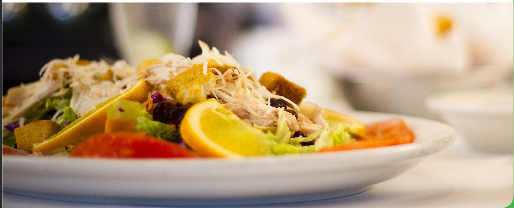
Washing hands often is the Key to keep food Safe
Food borne pathogens are widely found in soil, water, animals and people. These pathogens are carried on hands, wiping cloth,utensils, which can transfer them to food during preparation and handling
When to wash hands?
- Hands should be washed before, during and after preparing a meal
- Wash hands before eating
- Wash hands after using he rest room
- Wash hands after blowing your nose, coughing or sneezing
- Hands should be washed after handling poultry, raw meat or seafood
- Wash hands after touching garbage, pets or any other animals
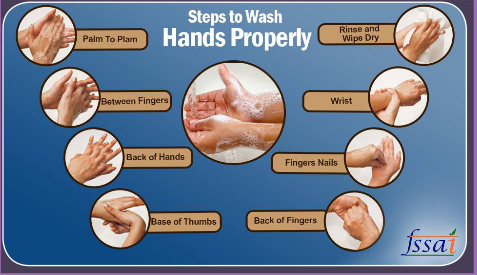
Healthy Tiffin, Healthy Children
- The key to a child’s healthy day is a balanced,healthy tiffin
- A balanced tiffin keeps children energetic the whole day helping them concentrate on studies
- Involve children in deciding their tiffin menu.This will encourage them to finish their meal and enable you to keep track of their nutrition
- Fruits are an important part of a child’s meal. Fruits provide adequate nutrition and vitamins
- Sugar content in a child’s tiffin should be low
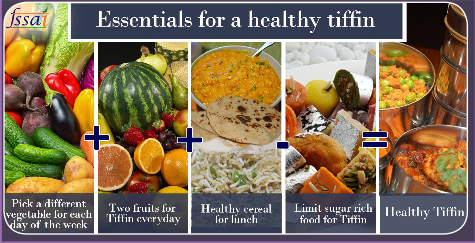
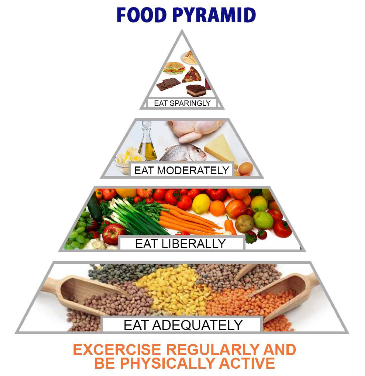
Source: Food Safety and Standards Authority of India (1.3MB)
Last Modified : 2/20/2020
© C–DAC.All content appearing on the vikaspedia portal is through collaborative effort of vikaspedia and its partners.We encourage you to use and share the content in a respectful and fair manner. Please leave all source links intact and adhere to applicable copyright and intellectual property guidelines and laws.
RELATED ITEMS
